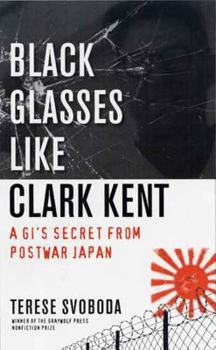Black Glasses Like Clark Kent: A Gi's Secret from Postwar Japan
After her Uncle's suicide, Terese Svoboda investigates his stunning claim that MPs may have executed their own men during the occupation of Japan after World war II
Format:Paperback
Language:English
ISBN:1555974902
ISBN13:9781555974909
Release Date:January 2008
Publisher:Graywolf Press
Length:112 Pages
Weight:0.05 lbs.
Dimensions:0.7" x 5.3" x 8.4"
Customer Reviews
3 ratings
read this book
Published by Thriftbooks.com User , 16 years ago
A meticulously researched memoir that in its revelation of truth reads as a work of fiction. The story leaves the reader with an emptiness that is borne of all suicides... even those where the victim is not one of our own. It takes courage to write a memoir like this one, how to tell what can be told and that which can not be expressed about an older family member, beloved and iconic, whose death forces those who wish to grieve silently to try to find a way back to the missing. It is a story of war, all wars, a story of survival and how with the stories we tell we keep the dead alive. The reader is relieved to see the quotidian details of the narrator's life as a way of momentary displacing grief, additionally these background noises remind us how we are all sitting next to someone who may be making a meatloaf while crying.
Artful, Sly, and honest
Published by Thriftbooks.com User , 16 years ago
Black Glasses Like Clark Kent is one of those non fiction books that reads like a novel, almost a French novel, in that the narrator is self-aware and weaving the opinions and feelings and revelations of the characters in the story around the action of the book. The action is haunting -- what DID happen to the MPs and their prisoners in Postwar Japan and why does no one want to talk about it -- but, equally as haunting, is the family suffering the loss of the uncle MP who recently committed suicide. Was what he saw and lived through unbearable? He has sent his writer niece (Terese Svoboda) the tapes of what happened and she listens and then begins to investigate. As with all suicides of someone one knows and loves, she feels she did not do enough. She does enough to tell his story and find the morality that he himself was reckoning with. Of course, the book makes us, once again, reflect on the high moral and mortal cost of all who "serve". It proves that if the serviceman is willing to remember, the pain can get him. Hence, many of Svoboda's interviewees aren't talking. Svoboda's style (in all her books) is spare, sly, and unflinching in getting to the heart of her story. In this book, her father (the uncle's brother) rallies her on. Personally, I am partial to non fiction by novelists, since they cannot but give you all the facts without going to the heart. The book stays with me.
Beautifully rendered ambitious book
Published by Thriftbooks.com User , 16 years ago
In Black Glasses Like Clark Kent, Terese Svoboda has rendered a beautifully nuanced memoir. Her uncle has a secret about his service as an MP in post-WWII occupied Japan that becomes more urgent when he sees the photographs of Abu Ghraib. But he won't reveal this secret easily to her. He sends her tapes of his memories through the mail, and Svoboda must piece together all the information at her hands -- her uncle's memories, his letters home to his girlfriend during his service, her familial relationships, statistics about the occupation of Japan -- many of which are conflicting, her understanding of heroism, and interviews with aging WWII veteran and Japanese native populations to try and uncover the secret. In the vein of Susan Griffin, Svoboda offers a mosaic text with pieces of the puzzle -- military documents, memories, photographs, and taped transcripts juxtaposed so that the reader joins her in the journey of trying to uncover what her uncle couldn't bring himself to say. This memoir is written for readers who like to be actively engaged by a story rather than sitting back and having it spoon fed to them. Her writing is beautiful. Her honesty is bracing. It should never be forgotten during the reading that this is a true story -- her uncle's last story. If we are to understand how events like Abu Ghraib happened, then we need to understand how it was not an isolated incident in our military history. Svoboda takes the difficult and accurate view that the brave men and women who serve in our military are often asked to do things in the line of duty that will haunt them the rest of their lives. I highly recommend this book.





